Eric Garner: Why #ICantBreathe is trending
- Published
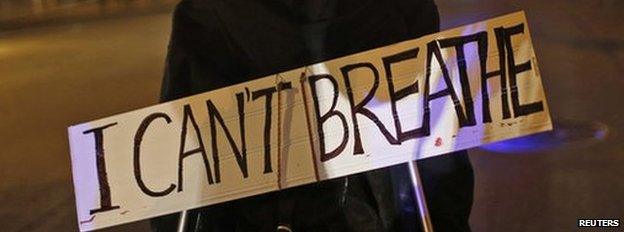
Nearly 300,000 Instagram and Twitter posts have featured #ICantBreathe within 24 hours, and so far there have been more than a million tweets about the Eric Garner case
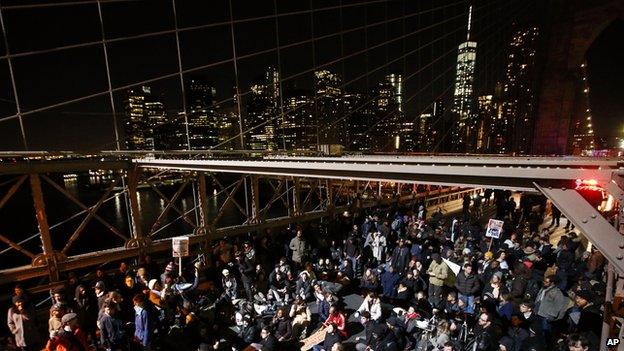
Thousands took to the streets of New York following the announcement
Protests kicked off in New York after a grand jury announced a police officer will not face trial over the death of Eric Garner.
The black 43-year-old died after police tried to arrest him for selling loose cigarettes.
The US justice department will launch a civil rights investigation into Mr Garner's death.
So why are hundreds of thousands of people using the hashtag #ICantBreathe to talk about the case?
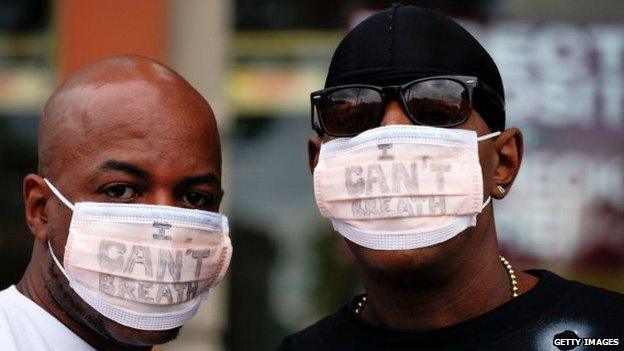
So far there have been more than a million tweets about the Eric Garner case
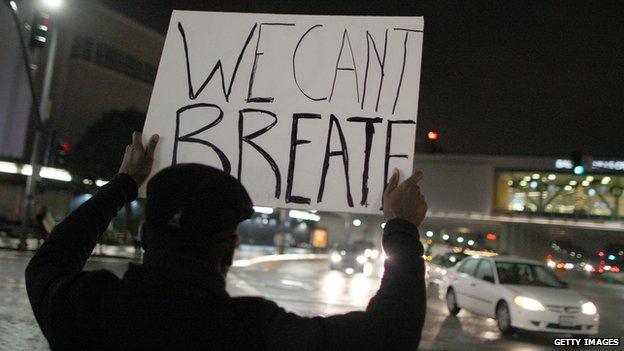
Chokehold
Footage of the arrest sparked national outrage - Nick Bryant reports
Eric Garner, 43, was stopped on a street in New York on 17 July on suspicion of selling loose, untaxed cigarettes.
After a confrontation with police he was wrestled to the ground and restrained by force. He became unresponsive and later died.
The confrontation between Mr Garner and police officer Daniel Pantaleo was filmed on a mobile phone.
The footage shows Mr Pantaleo and other officers arresting him after a lengthy exchange during which he verbally refuses to be handcuffed.
Several officers move to restrain Mr Garner, with Mr Pantaleo holding him by the neck.
The detainee, who it's now known was was asthmatic, can be heard shouting repeatedly, "I can't breathe!".
City officials found that Mr Garner's death was caused by "the compression of his chest and prone positioning during physical restraint by police".
Asthma and heart disease also contributed to his death, they said.
#CrimingWhileWhite
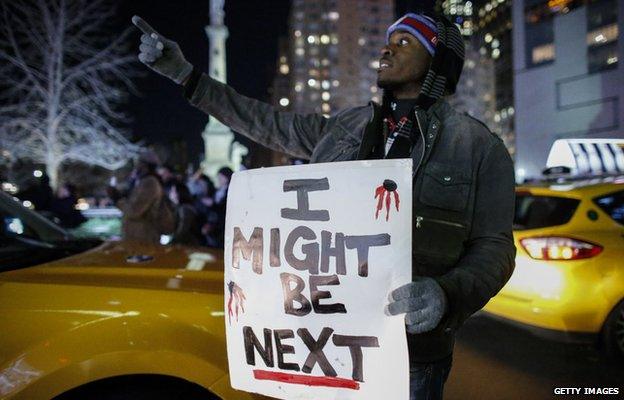
When the grand jury decided not to bring charges against Mr Pantaleo, legal experts reacted with surprise.
Ekow Yankah, a professor at Cardozo School of Law, told the Associated Press it was "hard to understand" how the jury failed to decide there was a case to answer.
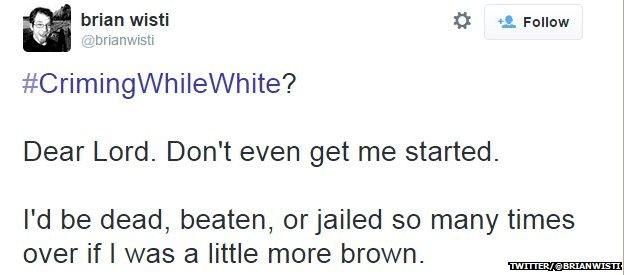
James Cohen of Fordham University Law School added that "logic doesn't play a role in this process" while President Barack Obama said the case spoke to "larger issues".
The row has sparked another hashtag, #CrimingWhileWhite, with Twitter and Instagram users claiming police have treated them differently to others.
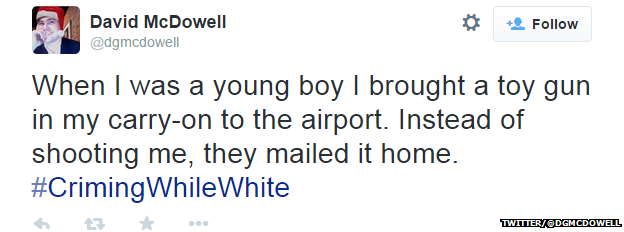
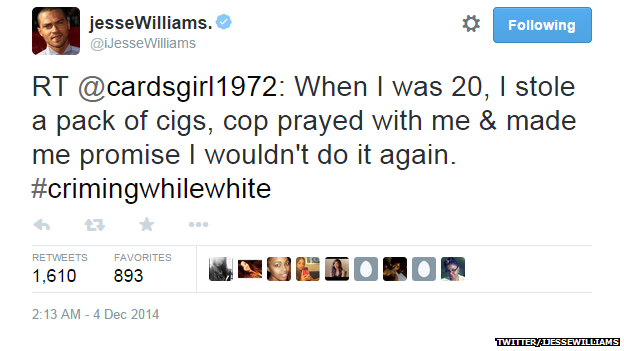
Many alleged they had been treated differently because of the colour of their skin, others used to tag to describe peaceful run-ins with police.

What is a grand jury?
In the US, a grand jury of ordinary citizens who represent the community is often used to decide whether there is enough evidence to pursue a prosecution.
Usually the only lawyer present in grand jury hearings is the prosecutor, who presents evidence.
Grand jury proceedings are conducted behind closed doors to encourage witnesses to speak freely and to protect the defendant's reputation, in case the jury does not bring a formal accusation.
Even though a grand jury may decide not to indict, a prosecutor could still bring the defendant to trial if they think they have a strong enough case.

Hands up, don't shoot
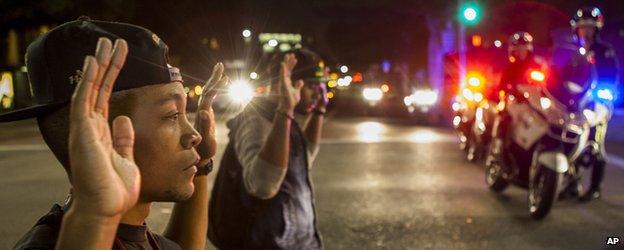
America saw a wave of race-related unrest only last week over the decision not to indict another white police officer who had shot dead a young black man in Ferguson, Missouri.
While thousands taking to the streets of America may echo the protests in Ferguson, the case is slightly different.
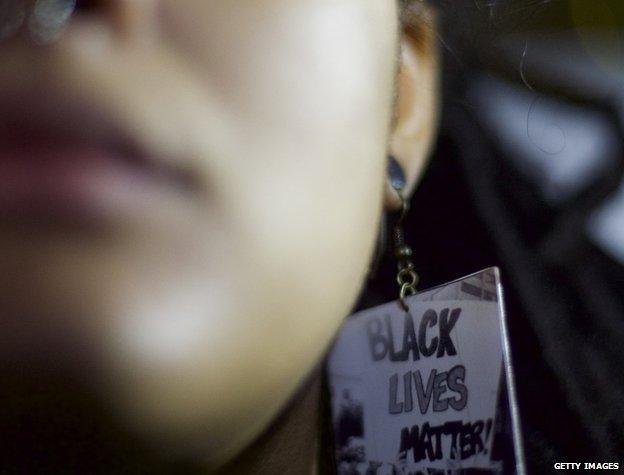
The phrase "black lives matter" has been chanted at protests in both Ferguson and New York
There is no direct footage of the exchange between police officer Darren Wilson and Mr Brown on 9 August in Ferguson, Missouri.
This meant there were always conflicting accounts about what happened.
The state prosecutor in that case said that the jury had exhaustively examined evidence.
The slogan "hands up, don't shoot" was coined in Ferguson in reference to witnesses who say Brown's hands were raised at the time of the shooting.
It became a rallying cry at events across the US and around the world.
Follow @BBCNewsbeat, external on Twitter and Radio1Newsbeat, external on YouTube